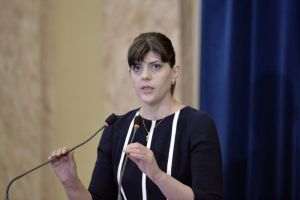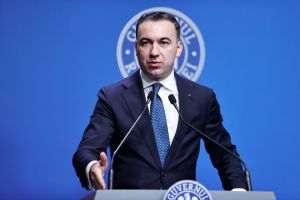Boc isn"t packing his stuff.
Boc is busy drafting the budget.
Together with Finance Minister Pogea.
The latest find of Romanian politicians is that we don"t need a Government.
We could have three governments, or we could have no government at all.
It wouldn"t make a difference.
In the beginning of the political crisis, I couldn"t imagine that a government that"s been dismissed could go on governing ad infinitum.
Well, actually it can!
The ephemeral nature of its ministers does not prevent the government from being eternal; all you have to do is, as soon as others are born, to replace the ones that are called to heaven, one by one.
Or, all of them at once.
Since it"s a government that"s been dismissed, they can be replaced without going through the Parliament.
No, a government that"s been dismissed does not have fewer attributions that a valid government; on the contrary, it has far bigger possibilities and wider liberties.
Imagine for instance, that Berceanu gets pissed due to some stupid thing that Emil Boc did and he subsequently resigns (attention! he resigns from his multiple positions as minister - yes he is in charge of several ministries!; and not only that - but he resigns from a function that he has already been sacked from).
Not a problem.
He gets replaced on the spot.
There are two solutions; someone else could be brought in to replace him, just like that (why bother with what the parliament has to say?!); or Elena Udrea could just take over the ministries of Transports and Agriculture, besides the ministries of Tourism and Environment she"s already in charge of (what"s so unusual in leading four ministries?!).
The political crisis makes us discover the constitution.
And the fact that such shenanigans are constitutional.
The Constitution does not forbid absurdities.
The Constitution does not restrict Mircea Geoană from saying, after meeting with the IMF delegation, that Romania will need to find a legal solution which would allow the dismissed government to submit the draft for the 2010 budget to the Parliament.
You know why Iliescu calls him "dumbass"?
Because the man can"t make a coherent statement.
So he does his best to bring down Emil Boc and then he calls him back to draft the essential law for governing the country in 2010?!
"Dumbass"!
Have you lost something?
A legal procedure, perhaps?!
No, man!
First of all, why don"t you crawl to Boc"s feet (I can"t believe there could be a greater humiliation on this world; crawling at someone else"s feet, it could be acceptable, but at Boc"s feet, I don"t think even a dog would do it).
Go on, say it: "Forgive me, sir!"
Because Boc, the little robot in the presidential kitchen (Traian"s "Roboc" as he has been nicknamed), has the legal procedure figured out, while you"re just sitting around trying to get a clue.
He has already used this procedure for the law of Fiscal Responsibility, that he put through the Parliament, after the government was dismissed.
His ministers, which are also members of the parliament, bring the laws they draft before the Parliament and also take full responsibility for them. That is the notorious procedure.
Yes, it"s absurd.
But it is constitutional.
The thing with the IMF seems to have taken the wind out of Mircea Geoană"s sails, but not "pretty boy" Crin Antonescu (that"s what he was called in Reşiţa).
Even though he is the president of the liberals, pretty boy Crin doesn"t seem to be too smart when it comes to financial issues (liberals have long had a traditional affinity for finance). When it comes to the IMF, pretty boy Crin is concerned about where the loan we took out from them went. As if he didn"t know that most of it went to the National Bank, to support the exchange rate.
He probably doesn"t know.
If he knew anything about finance, he would realize what a mistake backing Bogdan Olteanu as a deputy governor of the Central Bank was.
Pretty boy Crin mistakes his incompetence for a virtue: "Varujan, why don"t you speak for me, I don"t know much about stocks!", he asked fellow liberal Varujan Vosganian, on the occasion of the festive opening of the trading session of the Bucharest Stock Exchange, where pretty boy Crin was the guest of honor.
Handsome he may be, but he"s got his hang-ups.
Antonescu is hung-up because he has already lost the elections (well, anyway the elections the way he sees them - in the polls and on TV).
Media moguls bet on Geoană going to the second round of the elections. Because Băsescu has chosen Geoană as his adversary and he is ignoring any attacks from the other candidates (which would allow him to sway their voters in the second round).
Crin Antonescu has seen his efficiency cut in half.
He is now forced to attack Băsescu, as well as (especially) Geoană. And he has to attack media moguls and dispute the manipulation of the mass media and of the polls, that he seemed to like just fine until recently.
Pretty boy Crin is gasping for air, poor fellow.
He somehow produced a poll that makes him a winner in the first round against Geoană.
Here"s the opening line he used in Oradea: "From the top of the political hierarchy, I"ve come to bring you hope!"
It"s a good thing Iliescu isn"t his boss, because he would have most likely called Crin a "dummy".
One hundred and fifty years ago, in his correspondence with Engels, Marx said that people who use this type of political discourse are boors.
Antonescu is a graduate of the Faculty of Philosophy.
He probably doesn"t know much about that either.
In turn, the IMF is the true electoral agent of the "old gangster" Băsescu (as his former spokesperson who used to sing his praises, recently called him).
When he speaks of the IMF, Băsescu starts strutting.
"We will see...", was Băsescu"s reply to journalists who were asking him sarcastically: "Do you think the Parliament will validate the Croitoru Cabinet?!"
"We will see ..." - Băsescu growled two times, and the only thing that everyone understood was that the "old gangster" was simply making a threat.
Now we understand.
Through Croitoru (former IMF employee), "the old gangster" has hired the best electoral agent one could get - the IMF, the World Bank and the European Commission.
There you go! This is one for the books!
One visit from the IMF was enough, to take the air out of Mircea Geoană and have the "old gangster" start jumping for joy in the Cotroceni Palace (of course, the IMF trick doesn"t work on Crin Antonescu, because he knows nothing of this finance stuff, and he doesn"t know where the money is going, so he keeps dreaming of Reşiţa and joining the world"s pretty boys).
I"d like to tell you a story.
It"s pure history, but I can"t remember where I read it.
I think it was somewhere around 1700, when a shipment of Irish colonists arrived to America - Catholics and protestants.
They all agreed that before anything else, they would have to build a church. But they couldn"t agree where the church should be built: on top of the hill or down in the valley?
This was the beginning of a disagreement that lasted for dozens of days. In the cold, under the pouring rain. Their food ran out. First the elderly starved to death. Then the women and children. In the end they all died.
The church never got built.
I repeat this story is not a fantasy, it"s a historical fact.
Our situation is rather similar.
While politicians who don"t give a damn about us are squabbling, we are about to literally starve to death.
In a way, we"re lucky that the IMF exists.
After all, the laws that they"re asking the politicians to pass will work in our favor.
Does anybody think we would have had the budget ready this year had it not been for the IMF?
• The perfect coordination between the Parliament, the Government and the President
The financial union that Romania is borrowing money from (the European Commission, the World Bank and the IMF), will lend us the money provided we pass four laws:
1. The law of fiscal responsibility;
2. The law of pensions;
3. The law of the budget;
4. The law of unified compensation.
To be able to draw the money from the loan, those laws would need to be published in the Official Gazette, before December 10th, when the IMF scheduled its next visit.
The law of fiscal responsibility was submitted to the Parliament on October 22nd, according to the statement of the dismissed prime-minister, who said that several members of the Parliament took full responsibility for it.
Emil Boc previously said that he had submitted the law of pensions and that he was working on the 2010 budget, together with Gheorghe Pogea (the minister of Finance dismissed by the parliament and resubmitted for approval by the Croitoru cabinet, who was again rejected after his hearing by the Parliamentary commissions).
If the passing of the first three laws is simply an oddity by which the Parliament will (almost certainly) accept the laws over which it actually voted down the former government, when passing the fourth law we have a story that reaches the absolute heights of absurdity.
The law of unified wages is currently in the Constitutional Court, because it is part of the legislative package for which the Boc government has taken full responsibility, which caused it to be dismissed by the Parliament.
With its notorious cowardice when it comes to political issues, the Constitutional Court did not want to issue a ruling during the electoral campaign, for fear it would be seen as taking the side of one of the presidential candidates, so it has postponed making the decision until after the elections, on December 9th.
In order to be able to present the law to the IMF on Thursday, we"d need to have it declared constitutional, and the Court would have to do so early Wednesday morning: at noon the law would have to go through Parliament; Băsescu would have to sign it in the evening; then we"d have the workers in the printing shop of the Official Gazette pulling an all-nighter. (Heaven forbid they actually decide to go on strike that day! I"m sure they"d get a 5000% raise on the spot).
The installment we"re negotiating on December 10th is worth 1.5 billion Euros.
It will last us a month, considering we"re borrowing money at a rate of 55 million Euros /day.
Money is in really short supply!
Do you think the members of the Parliament, the people in the Government, the president and the Official Gazette will be able to get their act together to allow them to have the four laws ready for the IMF mission on December 10th?
I believe they will.
We have the expertise.
They could have done it successfully during the Ceauşescu regime.
•
• What happened to the money?
Crin Antonescu asked president Traian Băsescu and PSD Chairman, Mircea Geoană, to reveal what the "Băsescu - Geoană government" did so far with the loan from the IMF.
"We want to know what happened to the money that the IMF has given so far to the Băsescu - Geoană government when it was still in office. Where are the billions of Euros that we have to pay back and that they received? They were not used for investments, they were not used for pensions, or salaries, they seem to have vanished. The Government probably knows where they are and he should tell us. Otherwise, it is my conviction that Mr. Băsescu keeps Romania mired in this crisis, just to keep in place at any cost a government that is subordinated to him, because he doesn"t want the disastrous management of the Boc government to come out before the presidential elections. At the time a new government would come into office and a discharge would be given to the Minister of Finance many things we don"t know about could surface", Antonescu said.
We could suggest a better and quicker way for Crin Antonescu to find out what happened with the money from the IMF.
He should ask deputy governor of the National Bank Bogdan Olteanu.
Olteanu knows.
Most certainly.
•
• Geoană: I would like to suggest that the 65% parliamentary majority work together on the 2010 budget
The president of the PSD, Mircea Geoană, yesterday said, in Târgu Bujor, in the county of Galaţi, that he intends to propose that the 65% parliamentary majority cooperate on the 2010 budget.
He said, quoted by NewsIn: "these last five years, PNL, PD-L, UDMR and these last nine months, PSD as well have governed the country. Which is why I would like to propose that discussing and approving the budget no longer be used as a subject of the presidential campaign. We bear part of the blame and so do the other parties and I suggest that all the parties of the 65% parliamentary majority work together into drawing up the 2010 parliamentary majority".





























































